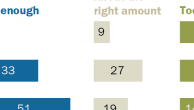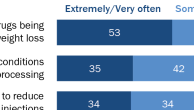As is often the case when we release new reports, there are various cycles of commentary that help to deepen the discussion of the findings. Our most recent release, “Digital Footprints,” has been no exception in that regard, as many thoughtful experts in the areas of privacy, online identity, search and social networking have generously contributed their analysis to the blogosphere and press coverage of the report this week. While the Pew Internet Project does not make policy recommendations, our findings often become part of the conversation that informs policy decisions.
Daniel J. Solove, an associate professor of law at the George Washington University Law School and author of the book, The Future of Reputation: Gossip, Rumor and Privacy on the Internet, shared his reactions to the findings in a recent TechNewsWorld article:
“I think it is true that people are currently not aware of the consequences of their online reputations,” Solove said. “This is all relatively new, so many people are putting information online without having experienced the dark side or realizing the damage it could do to themselves or others. That’s definitely a big problem.”
However, he goes on to explain that comfort with sharing information online doesn’t necessarily mean users don’t expect privacy:
“The idea that privacy is about keeping deep, dark secrets hidden has become an almost antiquated notion,” he explained. “Today, there are lots of other things people want, including control over the information so that it doesn’t get used in certain ways.”
In the same article, Marc Rotenberg, executive director of the Electronic Privacy Information Center (EPIC), sees the findings as further indication that users don’t have the tools they need to protect their privacy online:
“I think this is more evidence that there are not good tools out there that allow Internet users to safeguard their privacy,” Rotenberg said. “That’s been the problem with privacy, and not surprisingly, users are frustrated with opt-outs and systems that promise but don’t deliver anonymity.”
Over in the blogosphere, the discussion has ranged from looking at the implications for healthcare to the different behaviors of social networking teens vs. adults.
UC Berkeley researcher, danah boyd, highlights the finding that teens who maintain an online profile are actually more likely than adults to restrict access to friends only:
“This reminds me of adults who tell their kids never to meet strangers online under any circumstances and then proceed to use online dating sites and, rather than meet in public places, choose to go to the stranger’s private residence. Adults need to think about safety too – it’s not a story of binaries. The safe and practical approach is somewhere between abstinence and uber risky behavior.”
Continuing the conversation, today the Project will release new data that examines teenagers’ use of social media and their practice of restricting access to other online content such as photos and videos.




